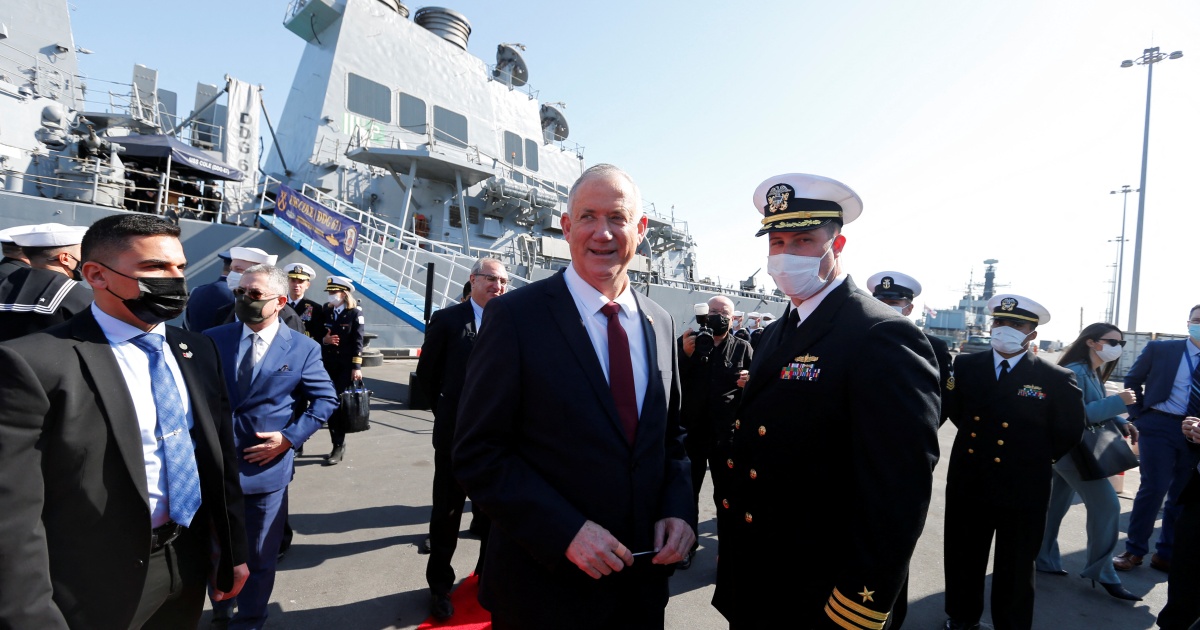
Agreement signed as Israeli defence minister Benny Gantz visits the kingdom amid heightened tensions in the region.
Israel and Bahrain have signed a security cooperation agreement, the first between Israel and a Gulf nation, during a visit by the Israeli defence minister to the kingdom amid heightened tensions in the region.
Bahrain, along with the United Arab Emirates, normalised relations with Israel in 2020 under the US-brokered Abraham Accords, partly out of shared concerns about Iran.
“The MOU [memorandum of understanding] framework will support any future cooperation in the areas of intelligence, mil-to-mil [military to military], industrial collaboration and more,” the Israeli Ministry of Defense said in a statement on Thursday.
An Israeli official said the agreement with Bahrain was the first such pact that Israel had reached with one of its new allies in the Gulf.
“Only one year following the signing of the [Abraham] Accords, we have achieved an important defence agreement which will contribute to the security of both countries and the stability of the region,” the Israeli defence ministry quoted Minister of Defense Benny Gantz as saying.
It said he and his Bahraini counterpart signed the document, and that Gantz had held talks with King Hamad bin Isa al-Khalifa at the royal palace.
Earlier in the day, Gantz visited the US Navy Fifth Fleet’s headquarters in Bahrain.
Bahrain hosts the Fifth Fleet’s headquarters as well as some operations for CENTCOM, a US military coordination umbrella organisation for the region that Israel joined last year.
“Against a backdrop of increasing maritime and aerial threats, our ironclad cooperation is more important than ever,” Gantz said on Twitter after the naval base visit.
Growing tensions
The visit comes at a time of growing tensions in the region driven by the unravelling of the international nuclear deal with Iran and the continuing war in Yemen. The US and Israel have accused Iran of carrying out a number of attacks on ships in the Gulf, including Israeli-linked cargo carriers.
The UAE said on Wednesday that it intercepted three drones that entered its airspace over unpopulated areas in the fourth such attack in the past few weeks.
The first three assaults were launched by Yemen’s Houthi movement in an escalation with a military coalition led by Saudi Arabia and which includes the UAE.
Israel has acknowledged stepping up naval operations in the Red Sea, an important waterway in the region.
Israel is joining this week a 60-nation US-led Middle East naval exercise alongside the UAE and Bahrain and, for the first time, publicly alongside Saudi Arabia and Oman, two countries it has no diplomatic relations with.
Bahrain and the United Arab Emirates were among four Arab countries that joined the Abraham Accords, a series of diplomatic pacts with Israel brokered by the Trump administration. Sudan and Morocco followed suit in formalising ties with Israel.
The deals enraged the Palestinians, who felt a betrayal of their national cause. Palestinian leaders saw it as an abandonment of a longstanding commitment in the Arab world that calls for Israeli withdrawal from occupied territory and acceptance of Palestinian statehood in return for normal relations with Arab countries.
For years, Israel and Bahrain maintained clandestine security ties, rooted in their concerns about Iran.
Since the agreement, the countries have opened embassies, signed a series of agreements and established direct flights and business ties.
Bahrain’s population is majority Shia, and the country has been ruled since 1783 by the Sunni Al Khalifa family. Since Iran’s 1979 Islamic Revolution, Bahrain’s rulers have accused Tehran of arming groups and fomenting dissent on the island, which Iran has denied.
Normalisation with Israel remains a contentious issue for Bahrain’s Shia majority, which long has accused the country’s Sunni Muslim rulers of treating them like second-class citizens.








